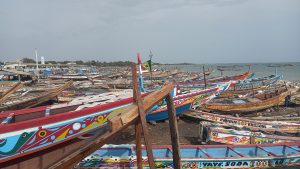A network of trainers and community radio broadcasters has been working hard to disseminate SSF Guidelines in West Africa, relying on local media and grassroots initiatives
This article is by Gaoussou Gueye (gaoussoug@gmail.com), President, African Confederation of Professional Artisanal Fishing Organizations, CAOPA, Mbour, Senegal
The Voluntary Guidelines for Securing Sustainable Small-Scale Fisheries in the Context of Food Security and Poverty Eradication (the SSF Guidelines) is an international framework adopted by the Committee on Fisheries (COFI) of the Food and Agriculture Organization of the United Nations (FAO) in 2014. These Guidelines aim to support the sustainability of small-scale fisheries (SSF) by strengthening the social, economic and environmental aspects of the sector.
A decade since FAO member states endorsed the SSF Guidelines, it is well worth examining the state of their implementation in West Africa. To focus on initiatives by governments and other stakeholders, as well as the impacts observed on the ground.
In Senegal, the implementation of the SSF Guidelines was led by a technical committee involving the administration, professional organizations and civil society. This process led to the development of an action plan and a project to implement the Guidelines. To make it easier to understand and adopt, they were translated into the national language, Wolof, and also disseminated through a video.
The translation and dissemination of the SSF Guidelines has led to a better understanding of the issues and principles of sustainable SSF by local stakeholders, thereby encouraging their involvement in the implementation. Acknowledging the importance of fish for food and nutritional security in Africa, Sidya Diouf, head of the SSF division at Senegal’s directorate of maritime fisheries, pointed out that “as part of the mechanisms for combating hunger and poverty in the world, FAO recommends an ecosystem approach in all fisheries, in particular small-scale fisheries, by encouraging the Guidelines.”
The implementation of the SSF Guidelines should be seen as a gradual process
However, he noted that all the potential has not been tapped to ensure greater availability of fish for local populations. For this reason, efforts are needed to effectively combat illegal fishing and bad fishing practices, for the professionalization of some fishing trades, for the establishment of improved landing points and small-scale processing sites to reduce post-capture losses, and for the development of inland aquaculture.
Ghana’s Ministry of Fisheries and Aquaculture Development, in collaboration with FAO, has also translated the SSF Guidelines into several local languages and produced dissemination videos. These initiatives aim to facilitate access to information and encourage the participation of fishing communities in decision-making processes. The translation and dissemination of the Guidelines in Ghana has thus helped to build the capacity of fishing communities and improve their participation in fisheries management processes.
“The translation and dissemination of the SSF Guidelines into several local languages is a continuation of a long-standing collaboration between FAO, its members in sub-Saharan Africa and the African Confederation of Artisanal Fishing Organizations (CAOPA), and is part of the global process to ensure the sustainability of small-scale fisheries,” said Ndiaga Gueye, Fisheries and Aquaculture Representative of FAO’s Regional Office for Africa.
He said that SSF play an important role in poverty reduction and food security in the African region. It is also a link in a long chain of social, cultural and economic activities that contribute to the well-being of local communities and society in general, and fishing is not only an economic activity, but also part of the culture, identity and way of life of fishing communities.
“The implementation of the SSF Guidelines should be seen as a gradual process. Its history informs the present, allowing SSF actors to access a formal space to express their views on the future governance of small-scale fisheries,” said Gueye.

CAOPA has played a key role in popularizing and implementing the SSF Guidelines in West Africa. It has organized information and outreach seminars in several countries, including Senegal, Guinea, Gambia, Mali, Ivory Coast and Ghana. In addition, CAOPA organized a webinar on the various chapters of the Guidelines, and trained local actors in the Saloum islands of Senegal, in collaboration with the Coastal Fishing Initiative (CFI).
Mamadou Thiam, consultant in fisheries economics and management, representing the IPC-AO project, said that the specific aims of the training were “to support the implementation of an ecosystem approach to fisheries (EAF) and better application of international instruments by capitalizing on existing experience; to increase the economic and social value produced by inshore fishing to support human well-being and livelihoods; and to pay particular attention to small-scale fishing.”
CAOPA’s initiatives have raised awareness of sustainability issues among small-scale fishers and strengthened their ability to implement the SSF Guidelines in their day-to-day activities. CAOPA has also produced a 12-page guide for trainers on the Guidelines, apart from training Senegal’s fishing and general community radio association on the guidelines.
These activities have enabled the creation of a network of trainers and community radio broadcasters capable of widely disseminating the principles and good practices of sustainable small-scale fishing, thereby contributing to the appropriation and implementation of the SSF Guidelines by local communities. To this end, a dozen radio programmes have been produced in the Wolof language.
For more
Confédération Africaine des Organisations de Pêche Artisanale (CAOPA)
https://caopa.org/
Report of the workshop of information and awareness-raising on the voluntary Guidelines for sustainable small-scale fisheries for presenters and and journalists of Senegalese community radio, Cap Saint-Louis, 02-03-2021
CAOPA: DSSF Guidelines
https://caopa.org/en/dssf-guidelines/